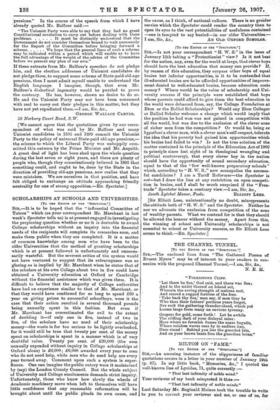ITo THE EDITOR OF THE "SPECTATOR:1 • Sin,—Is not your
correspondent "H. W. S." in the issue of January 12th taking a "Protectionist" view P Is it not best for the nation, nay, even for the world at large, that clever boys should have the best education that money can provide ? If, by reason of this education, they surpass other boys of equal brains but inferior opportunities, is it to be contended that ill-educated brains are to be afforded opportunities of improve- ment denied to well-educated brains, because education costs money ? Where would be the value of scholarship and. Uni- versity success if the principle were established that boys whose parents could afford to give them the beet education in the world were debarred from, say, the College Foundation at Eton or the Balliol Scholarships ? Would any Eton Colleger or Balliol Scholar welcome a change which would imply that the position he bad won was not gained in competition with all the world, but was due to the exclusion of the clever sons of richer men from the competition ? Or would he, being ex hypotheei a clever man, with a clever man's self-respect, tolerate the idea that his poverty had gained him opportunities which his brains had failed to win ? Is not the true solution of the matter contained in the principle of the Education Act of 1902 (a principle since lost sight of in theological wrangling and political controversy), that every clever boy in the nation should have the opportunity of sound secondary education, equal to that of the "few well-known preparatory schools" which, according to "a W. S.," now monopolise the success- ful candidates? I am a Tariff Reformer—the Spectator is not—but I draw the line at any restriction on open competi- tion in brains, and I shall be much surprised if the " Prerp trade" Spectator takes a contrary view.—I am, Sir, &c., [Sir Elliott Lees, unintentionally no doubt, misrepresents the attitude both of "H. W. S." and the Spectator. Neither he nor we advocate the exclusion from competition of the sons of wealthy parents. What we contend for is that they should be allowed the honour without the money. Apart from tide, the winning of school and University 'scholarships is not essential to school or University success, as Sir Elliott Lees seems to think.—En. Spectator.]






















































 Previous page
Previous page